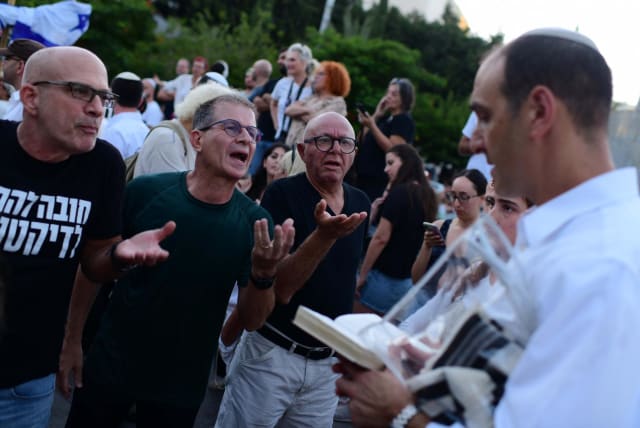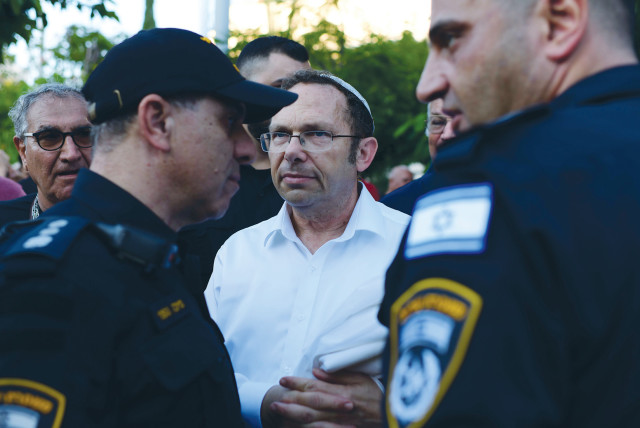Editor's Notes: Reawakening the synagogue and state debate in Israel

The events of the past week were a wake-up call. Tension over synagogue and state issues is steadily building in Israel and if it is permitted to erupt, the results could be devastating.
That was the title we at the Post chose to give Wednesday’s editorial decrying the violence in Tel Aviv’s Dizengoff Square over Yom Kippur, which shook a country already rankled by the events of recent months.
As worshipers participated in the solemn Kol Nidre service that marks the start of the most sacred day on the Jewish calendar, they were set upon by hundreds of protesters determined to disrupt the prayers in the iconic square.
Storming the area designated for the event, the protesters shouted “Shame! Shame!”, removed rows of plastic chairs meant for participants, and dismantled a line of flags set up to separate men and women during the service.
Scuffles and shouting matches erupted and worshipers dressed in traditional white were seen bursting into tears.
According to at least one report, some female protesters pushed their way into the area designated for men and started eating sandwiches in front of the stunned worshipers, many of whom were fasting in observance of the holiday.
No permit for Yom Kippur
Sunday’s events came after the Tel Aviv municipality announced that it would not permit the organization behind the outdoor Yom Kippur service – which was initiated during the coronavirus pandemic and had since taken place annually without incident – to erect a mechitza (a physical partition between men and women) similar to that which exists in Orthodox synagogues, explaining that such a barrier would constitute a violation of municipal ordinances barring gender-separated events in public places.
The group, Rosh Yehudi (Jewish Head), petitioned the Tel Aviv District Court against the municipality’s decision, but the judge upheld the ban. An appeal to the Supreme Court was also unsuccessful.
The organizers nevertheless went ahead and put up the ersatz mechitza, prompting opponents to circulate a call for city residents to disrupt the service. Several similar clashes took place at outdoor Yom Kippur services elsewhere in Tel Aviv and in other Israeli cities.
(Some commentators noted that the Tel Aviv municipality took no apparent steps against barriers erected by Muslim worshipers to separate men and women at outdoor prayers during the holiday of Eid al-Fitr several months ago.)
Rather than condemning the violence, some leaders seemed intent on inflaming tensions, blaming the worshipers while defending the protesters.
“Unfortunately, yesterday evening religious and messianic extremists decided to trample the court’s decision and put up a separation between men and women at a Yom Kippur service,” wrote Tel Aviv Mayor Ron Huldai, who is running for reelection, on X, formerly Twitter. “A crowd of protesters, residents of the city, prevented the service in Dizengoff Square from taking place in an unlawful manner.”
“I want to make it very clear: I will not enable anyone to change the character of our city!” he added. “There is no place in Tel Aviv-Jaffa for gender separation and discrimination in public spaces. Those who do not respect municipal ordinances and the law will no longer receive permits to conduct public activities in the city!”Government and opposition leaders took potshots at one another.
“In the Jewish state, on the holiest day to the Jewish people, left-wing protesters attacked Jews at prayer,” said Prime Minister Benjamin Netanyahu. “It seems there are no limits, no norms, and no restrictions to left-wing extremists’ hatred.”
“Those who have decided to drive a wedge between us have managed to desecrate this holy day with coercion and baseless hatred,” said National Unity party leader Benny Gantz. “The prime minister, the greatest instigator of hatred, has decided to fan the flames.”
National Security Minister Itamar Ben-Gvir, a former far-right activist, announced his intention to hold a prayer service in Dizengoff Square and dared “the anarchists” to try and disrupt it before calling it off under pressure from fellow ministers.
While the dreadful events on Yom Kippur drew much of the media attention this week, there was another story that flew largely under the radar but also deserves consideration.
On Tuesday, the day after the holiday, the Supreme Court ordered the government to explain why it hasn’t taken disciplinary action against Jerusalem Sephardi Chief Rabbi Shlomo Amar for incendiary remarks he has made against Reform Jews, the LGBTQ community, and the Women of the Wall organization.
The injunction came in response to a petition by the Israeli Reform Movement, Women of the Wall, and the Jerusalem Open House for Pride and Tolerance, a prominent LGBTQ group.
The groups noted they had asked successive governments to censure Amar – a public official and state employee – no fewer than 16 times over the past 4.5 years, to no avail.
Amar, a former chief rabbi of Israel, has referred to the LGBTQ community as “a cult of abomination,” compared LGBTQ individuals to animals, and blamed the increase in same-sex marriages for earthquakes in Israel; earlier this year, he said the appointment of Likud lawmaker Amir Ohana, an openly gay man, as speaker of the Knesset was “unbearable.”
He has accused Women of the Wall – a feminist group that seeks to secure equal prayer rights for women at the Western Wall – of “uprooting the Torah, trampling and running over the dignity of the Torah” and said they are akin to Satan. He has called Reform Jews “evil people who do every injustice in the world against the Torah.”
The current chief rabbis – also government employees – rushed to Amar’s defense.
“Every rabbi has the right and duty to express his position subject to halacha (religious law),” said Ashkenazi Chief Rabbi David Lau. “Attempts to threaten through spiteful petitions will not loosen the hands of the rabbis of Israel. Any attempt to interfere with the halachic judgment of the rabbis of Israel in any halachic matter will not succeed.”
Sephardi Chief Rabbi Yitzhak Yosef slammed the court order as “unacceptable” and said that “Amar’s statements are by virtue of his position as a rabbi and his duty was to express his opinion without fear. I call on the Supreme Court to withdraw this ruling and allow freedom of speech for rabbis in order to fulfill their duties.”
Although Dizengoff Square in Tel Aviv and the Supreme Court in Jerusalem are miles apart and the events that transpired in each place this week may appear to be unrelated, they both indicate a malaise spreading through Israeli society that must be addressed – and now.
The tenor of the debate in Israel has reached a fever pitch, and while much of the national discourse has recently centered on the government’s judicial reform, it was only a matter of time before other issues of significance were swept into the maelstrom.
The relationship between Israel’s Jewish identity and its democratic character has been a subject of debate throughout the country’s 75 years, and while the vaunted “status quo” has held for much of that period, questions of synagogue and state tend to flare up from time to time, occasionally producing changes that impact life in this country in major or subtle ways.
This is one such moment, and it may be more consequential than almost any before it.
On the face of it, the questions are narrow and focused: Should authorities – and members of the public – be able to prevent Jews from using a public space to pray in a traditional manner in order to uphold principles of equality? Should rabbis employed by the government be free to engage in appalling rhetoric about segments of the very communities they are supposed to serve in the name of religious liberty?
But the underlying questions about the role of Judaism in the public sphere, the extent to which the government should be involved in religious life, and the proper balance between Jewish and secular values in society go to the very core of what it means to be a Jewish and democratic state – and the time has come to tackle them head-on.
There is a beautiful piyyut (liturgical poem) sung by Sephardi Jews as part of Selichot, the penitential prayers recited in the weeks leading up to Yom Kippur, that opens with the words, Ben adam, ma lecha nirdam? – “Son of man, why do you slumber?”
The events of the past week were a wake-up call. Tension over synagogue and state issues is steadily building in Israel and if it is permitted to erupt, the results could be devastating to both Judaism and secular life in the country – and to the delicate fabric of Israeli society. The violence in Dizengoff Square may have been but a small taste of what lies ahead if we don’t engage in an urgent national conversation about what we want this country to look like and how we can live together in a state that is, at once, proudly Jewish and robustly democratic.
We continue to slumber at our own peril.
Jerusalem Post Store
`; document.getElementById("linkPremium").innerHTML = cont; var divWithLink = document.getElementById("premium-link"); if (divWithLink !== null && divWithLink !== 'undefined') { divWithLink.style.border = "solid 1px #cb0f3e"; divWithLink.style.textAlign = "center"; divWithLink.style.marginBottom = "15px"; divWithLink.style.marginTop = "15px"; divWithLink.style.width = "100%"; divWithLink.style.backgroundColor = "#122952"; divWithLink.style.color = "#ffffff"; divWithLink.style.lineHeight = "1.5"; } } (function (v, i) { });

